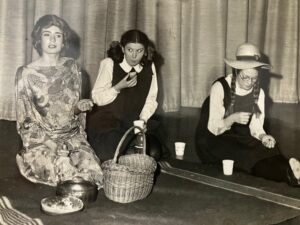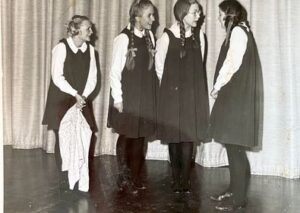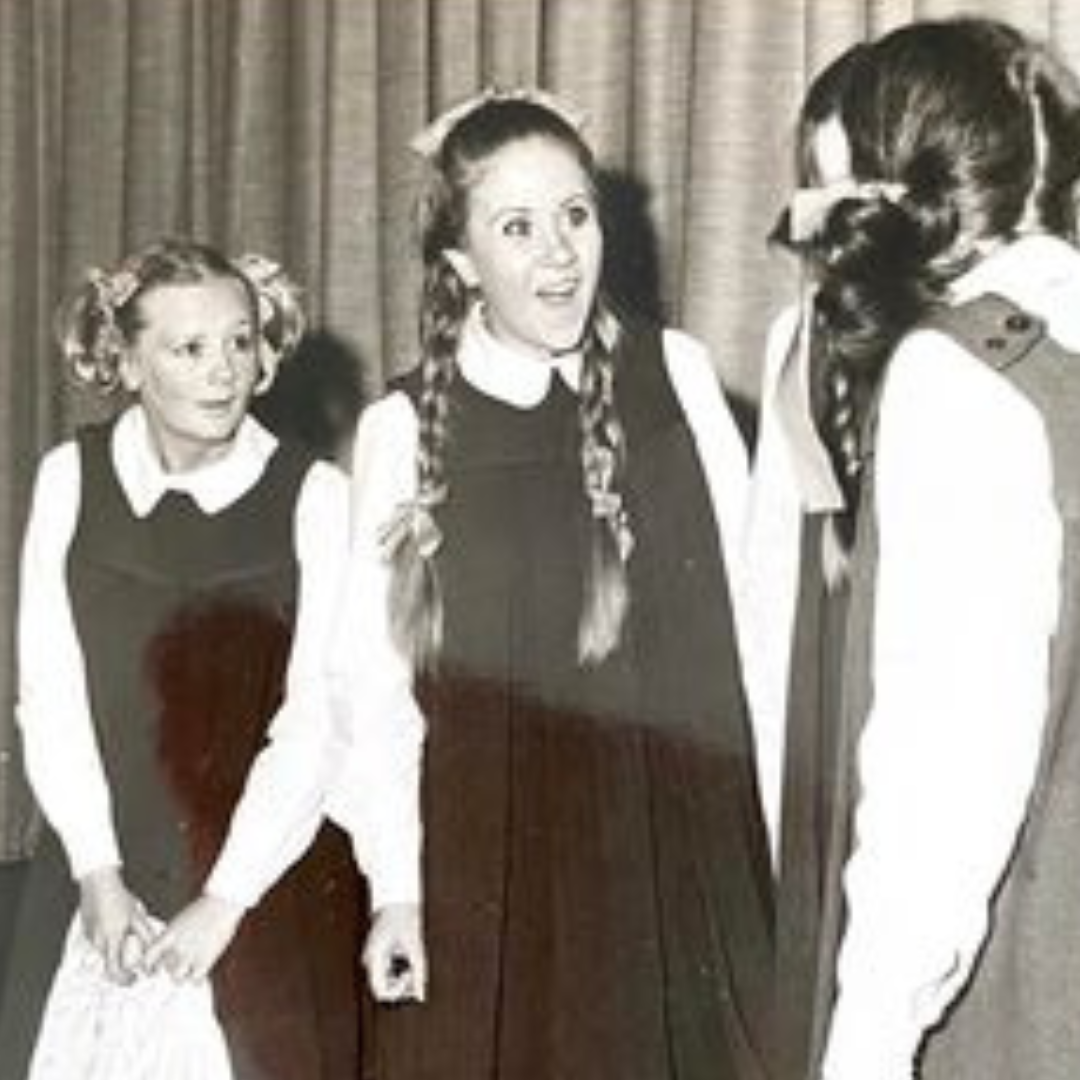What drama teaches you can be incorporated into any profession because communication is the basis of all human activity
Sue Lavender – DSL Alumni – class of 1970
Last May we were visited by a graduate of 1970 and, following a recent post of images and posters from our archive, she got back in touch with her memories of the school and her training.
It’s so lovely to catch up with our Alumni from across the years. Can you tell us a little about yourself and your training at DSL?
I’m Susan Lavender, known as “Sue”, including while I was studying at the “Drama Studio”, as it was called back then, from 1968 to 1970. I graduated in 1970, the first graduating class at DSL’s location in Grange Court.
There was no choice of courses then. Actor Training was much less sophisticated than it is now. Universities were only just starting to introduce drama as a degree subject, mostly combined with another subject. Drama schools did not offer degree programmes.
It was a two-year intensive course, with just a short break between terms so there were always two years of students at any one time: Year 1 and Year 2. The only people working at the school were Peter Layton, founder of DSL, who taught, directed and administered the school, and guest teachers and directors. We didn’t have admin, marketing, or costume departments or any other departments back then. We made, borrowed or occasionally loaned costumes, props or anything else we needed.
What was a typical week at DSL like for you as a student? What were the regular classes?
From memory, we had two sessions of classes in the morning and one or two in the afternoon. If it was a single afternoon session it would take up the whole afternoon, as would be the case for rehearsals.
On weekday mornings those of us living in at school, might grab a tea or coffee together in the kitchen, but usually we would roll out of bed at the last minute to get to Studio 1 by 10am when all the students would assemble. Peter Layton would speak to us for a few minutes and tell us any news we needed to know or read us the riot act for something that happened the day before, as the case may be. Then Year 1 and Year 2 students would split for their respective classes. We would regroup for a short lunch – usually at the Red Lion, a little further down St. Mary’s road (the B455), before returning for afternoon classes.
Regular classes were:
Improvisation – a lot of emphasis was placed on improvisation. (I know nowadays detailed techniques and systems for cues are taught for improvisation performances. We used to be given at most a prompt to start us off and after that we were on our own, but it was excellent training for dealing with the unexpected on stage.) Occasionally we would go out to Walpole Park across the road to improvise there. That was a real treat even if dog-walkers and regular park-goers thought we were a little crazy.
Characterisation (physical, mental and vocal – accents). I remember once we were sent to London Zoo to work on physical characterisation of an animal, which we would perform in class the next day. I chose the penguins.
Voice training and speech. Movement (a combination of aerobics, dance, yoga) and mime. Stage management and set building. Each student had to stage manage at least one play and we built our own sets for our productions.
Rehearsals We always had a production under way, and guest directors came in for some of them to allow us to become accustomed to different directing styles; some students were allowed to direct some scenes and plays. Of course we didn’t have a theatre in Grange Court in those days. We had to rent venues to put on our productions, often in nearby Southall. We used the studio rooms for rehearsals right up to dress rehearsal in the venue.
For film work we collaborated with students from Twickenham film studios. I remember some of us were selected to be in a film they produced. It really brought home to me the dedication needed for film work. We had to camp out for days in the countryside waiting for our scene to be filmed. The song “Wild Thing” by the Troggs was constantly playing on someone’s cassette-player and when I hear it even now it brings back memories of those happy days.
At the weekends there were longer and more liquid sessions at the Red Lion, which sometimes got a bit rowdy. Some of our boys were even banned from the pub for a while. We would get together to eat, play music and sometimes we would gather in a field or common to just sit in a circle (something like a reprisal of a scene from “Easy Rider” but I hasten to add that no one ever came to any harm).
There were also group outings. One time we drove (I think it was to Birmingham) to see the celebrated Polish director and father of experimental theatre, Jerzy Grotowski. I was exhausted on the way back and one of the boys had to take the wheel before I fell asleep in the back.
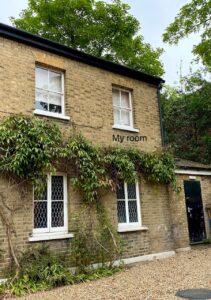
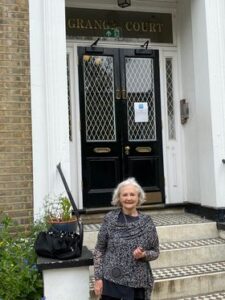
Sue’s bedroom window at Grange Court and outside the main entrance in May 2023
Living at the school must have made the experience even more intense – how many other students and staff lived on site with you?
We were like a family living at Grange Court. My first year at the Drama Studio was actually in rented premises, a church hall, in Putney on the Upper Richmond Road. When Peter Layton decided to buy Grange Court in Ealing, all the students helped to decorate the old house and prepare it to become our real home the following year. That made us truly bond with Grange Court and each other.
There were at least six of us students living in at any one time – sometimes more, including occasional non-boarders sleeping over in Studio 2. On the second floor there was a big room, which housed two boys, Michael Dean and Martin (I don’t remember his surname). On the same floor there was the kitchen and common room which we shared. It became a real gathering place, the centre of our communal lives. We had a pre-payment electricity meter and whenever the lights went out, there would be a hush while we all hoped and prayed that someone else would put money in the meter!
Peter Layton and his wife lived in a flat on the third floor. They had a little dog. Sometimes student activities on the second floor would disturb Peter’s family. Once we had a strobe light for a future production and, being the smallest student, I stood on the common room table – reprising the role of the master of ceremonies in They Shoot Horses, Don’t They? As I flashed the strobe light around the room at the others who all danced in a circle in a dire re-creation of the film. Peter discovered us, took the strobe away and got quite cross.
There was a little corridor down from the second floor with two small rooms leading off it. I lived in the little room at the end of that corridor. When I visited DSL in May 2023, I was able to find where my room used to be. From the outside I could still clearly identify my window and the view of the flats on the other side of Grange Road (shown below). I used to park my car just underneath in the driveway.
I remember there used to be a break in the side of the wall around Grange Court, which we used as a short cut to get to St. Mary’s Road when we went shopping or to get to the Tube. Peter used to tell us we had to use the main entrance on Grange Road and walk around the corner to St. Mary’s Road.
At least two boys lived in the annex to Grange Court, which we used to call “the Little House”. My classmate and friend, American Brian Wilson, lived there.
Even students and their partners, who didn’t live in, frequented Grange Court and the Little House, after classes. These included Oliver Foot, and Scottish Andy (can’t remember his surname) who regularly played opposite me.
The rent for my room at Grange Court was £4 10s. and I had to do part-time jobs to contribute to it. From 1968, when we were still in Putney, I started to work in West End theatres, selling ice-creams in the evenings. Another student, Keith Skinner, who played Balthazar in the 1968 production of Romeo and Juliet, starring Olivia Hussey and Leonard Whiting, introduced me to this job. We both had cars, so we would take it in turns driving to Piccadilly to work in the Shaftesbury Avenue theatres and back. I continued this work when I moved into Grange Court but once I got settled there, I worked part-time in a foster home in Ealing. When I graduated the foster family gave me a beautiful book of Shakespeare’s plays which I still have with their inscription in the front.
Do you remember the productions you performed in and who directed them?
I’ve attached the list of all my productions which I was given upon graduation. (shown below)
Some of the ones that stand out for me are perhaps the following:
The Prime of Miss Jean Brodie – I played mischievous schoolgirl, Monica. Ironically, Grange Court was originally a girls’ school. I channelled my experience of not having been long out of sixth form into my characterisation.
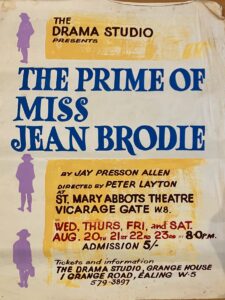
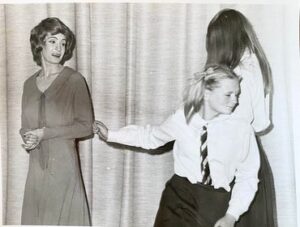
Poster and rehearsal photo of The Prime of Miss Jean Brodie 1969
The Bald Prima Donna by Ionesco: theatre of the absurd was trending in those days. We loved doing absurd theatre because it gave so much scope for us to improvise and be creative. I loved the comedy in it. My classmate, Oliver Foot, nephew of Michael Foot, directed the production. Oliver ultimately opened his own theatre company, Foot’s Barn.
The Lesson, another Ionesco play. Because I was small and the youngest in my year I was often cast as a child. The Lesson was a fantastic opportunity as the play is a two-hander which gradually builds into a very unexpected climax.
Who’s Afraid of Virginia Woolf: I played Honey and Andy played my husband, Nick. We were supporting roles to the leads, George, played by Brian Wilson and Martha, played by my South American classmate, Nelida. I remember cradling a whisky bottle as if it were a baby.
The Eagle Has Two Heads by Jean Cocteau was the first major production I was in at the Drama Studio and I also stage-managed it. I didn’t have any lines, but I certainly played a challenging role. Being the smallest, I was cast as Tony, a young servant boy, who was unable to hear or speak. I practised sign language to use in the play.
Othello: I played Bianca. We were loaned costumes that had been used in the 1968 production of Romeo and Juliet and I spotted a dress label with the name “Olivia Hussey” on it.
As You Like it: I played Phoebe, and I have used her main speech often for auditions since that time. She really cemented my love for comedy.
After the Fall by Arthur Miller. I played Miller’s jealous first wife, Louise. Oliver Foot was Quentin (who represented Miller in the play).
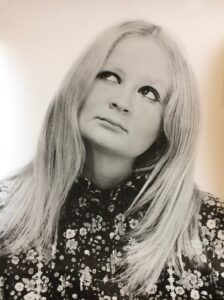
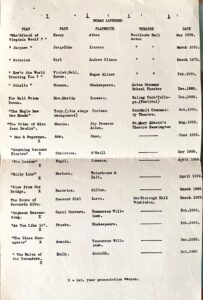
Sue’s headshot from 1970 and her list of DSL productions
What did you go on to do after DSL? Are you still in touch with any of your classmates?
I went on to get a First in Italian and Romanian language and literature at University College London and later on two law degrees from McGill University in Montreal, Quebec. I had been offered places to do combined Drama and Italian at Birmingham and Hull, but I felt it would be an academic approach to drama, so I didn’t take up these offers.
I was good academically and when Peter Layton interviewed me for my place at the Drama Studio, he prophetically told me that I had a second string to my bow, i.e. an academic career and that this might lead me away from acting. I went on to practise law because I needed to earn money, having a sick husband and young child at the time. Nevertheless, I have continued to perform throughout my life. While living in Beijing in the 1990s I did some film work playing parts requiring a Westerner. I live in Hong Kong now and regularly take part in theatre productions and other types of acting here.
I recently played Mussolini’s wife, Rachele, in Mussolini’s Mistresses, directed and written by Clare Stearns, a personal tutor at DSL, who put me back in touch with DSL staff while I was in the UK last year.
I am a Radio Television Hong Kong (RTHK) English-language newsreader and past radio presenter. I have taken part in promotional and commercial video, including a BBC World tourism video, shot on location in Hainan Island, Sanya Forever, and advertising commercials.
I was in a Chinese martial arts film, Stop Hits 2 and a local indie film As Closely Linked as Flesh and Blood. I reached the global semi-finals of the World Monologue Games 2020 with a video performance of Mrs. Cherry Owen from Dylan Thomas’ Under Milk Wood, and I do voice-over work, including English language training recordings.
Sadly, I am no longer in touch with my classmates. I remained in touch with Brian Wilson for some time, but he passed away in the later 1970s. I am still in contact with his best friend, Don Green, who used to be part of our Grange Court family, because he visited so often, including sleeping on the floor of the Little House more than once in a while. Don ended up in Bologna, Italy, where my mother came from, so we used to see each other there and we still correspond and reminisce about Brian and our time in Ealing.
Oliver Foot’s theatre company, Foot’s Barn, came to Hong Kong some time ago and I met them, and organised an RTHK radio interview with them, but Oliver is no longer involved in the theatre unfortunately.
What advice or insight can you offer the 2024 cohorts – or anyone considering applying to DSL today?
To those considering applying to DSL, I would say, definitely, go for it! I wish you all the same wonderful experience which I had, amplified by the advances in curriculum and opportunities which the 21st century has brought. Studying acting in a great cohesive environment like DSL, will always stand you in good stead even if you don’t end up with a career in drama, which I know is hard even these days. What drama teaches you can be incorporated into any profession because communication is the basis of all human activity.
DSL is a wonderful school offering a plethora of opportunities in various fields of drama. From my visit in May 2023, I can see that it has come a long way and expanded its curriculum so much from when I was there. Still, I can testify to its proud foundation and history from the 1960s from which its present teaching and reputation have evolved and flourished. From DSL’s debut in rented premises in Putney, Grange Court emerged as a truly holistic hub of drama fostering empathy among future actors, directors, drama professionals and teachers in a unique boutique setting. The old house is a prime example of early Victorian architecture, which has stood at 1 Grange Road for well over 150 years. Let it inspire you. It is imbued with the spirit of all the students who have studied there since my classmates, and I helped to renovate and decorate it at the end of the 1960s before moving in.
Ealing itself is also an inspirational place to study drama. Grange Court is just across the road from the Ealing Studios where the Ealing Comedies were produced and so many other great film and TV productions. The Red Lion is just down the road, the watering hole of my “Class of 1970”, where we used to bump into actors like Peter Cook and Dudley Moore, taking a break from filming. (The pub was known as “Stage 6”, where actors could be found if they went missing from Ealing Studios’ five stages). I revisited the Red Lion last May and was happy to see that the classic photos of the Ealing Comedies were still there on the walls of the pub. The Red Lion is surely part of Ealing’s film history and traditions to this day.
As far as acting is concerned, my tip would be: learn your cues by heart, not just your own lines, make sure that everything is hard-wired, and be ready to improvise on stage and bail out your fellow actors if they miss a beat at any time. Underneath all the hyperbole surrounding the acting world, I still believe there is a truly unique irreplaceable empathy that binds actors and drama people together, that you won’t find in other areas of human co-existence.
For those who may face my quandary upon graduation: follow your dream and don’t be distracted when the going gets rough. There is nothing like doing the thing you love, however hard that may turn out to be.
My time at the Drama Studio was undoubtedly the best time of my life. To this year’s graduates, I would say:
You are the result of a long tradition of drama at DSL in a wonderful historic setting. I wish you all great careers in the best profession of all, and know that the Class of 1970 stands behind you, together with all the other previous Classes of DSL graduates!
Thanks so much for taking the time to share your memories and experience with us Sue, it’s inspirational and your joy in the retelling is contagious!
———————————————————————–
We love hearing from graduates and finding out what paths they took after they left us. If you recognize yourself in any of Sue’s stories, or if you have some memories to share, please get in touch.
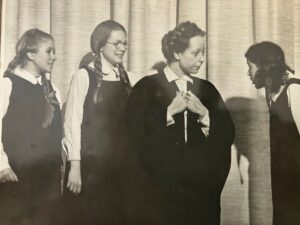
More rehearsal photos from The Prime of Miss Jean Brodie 1969.
